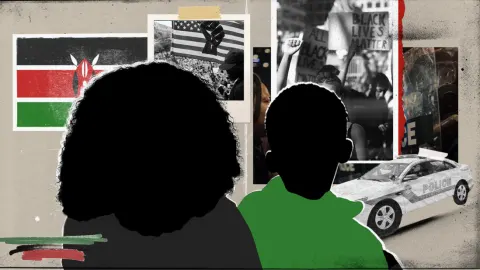
—
I was cradling my newborn son one night in November 2016 when I suddenly began to sob. Something had dawned on me that filled me with fear.
I was the mother of a Black son in America.
I was born in Kenya and moved to the US after high school to attend college. I have long felt a conflict between my race and my nationality.
In some ways, I didn’t know I was Black until I came to the US.
That night, as I held my son, Liam, and listened to TV pundits debate what the presidential election results meant for people of color, I felt frightened for his future.
I knew that no matter how he chose to define himself as the son of two Kenyan immigrants, he would be seen first and foremost as a Black man. And I was well aware of the prejudices that come with that label.
Despite living in the US for years and covering incidents of racism as a journalist, I wasn’t sure I was equipped to help him navigate life in a country where race is such a hot-button issue.
With my son’s birth, the dynamic of my life in America had changed. I could no longer observe issues of race as a bystander from another country who wasn’t sure where she fit in the conversation. I was the mother of a Kenyan American son, a Black son.
To keep him safe, I knew I had to evolve. Little did I know my son would show me a new perspective on my adopted country.
Until I came to the US, I never thought much about race
For the first half of my life, I had never worried about my Blackness or looked at my life through the lens of race.
In Kenya, where more than 90% of the population is Black, race was never a factor in how we viewed the world.
In Kenya, there are tensions around colorism, class and different ethnicities. But except for South Africa, issues around Black and White identity are non-existent in a lot of African countries, said Karsonya Wise Whitehead, associate professor of African and African American Studies at Loyola University.
“When I was in Kenya, the guy who took my bag (at the airport) was Black. The guy who flew the plane was Black. The president was Black,” said Whitehead, who’s traveled to many African countries. “As a Black person from an African country, you haven’t seen the long history of oppression, the long history of social injustice that those of us who were born here, who are descendants of enslaved people, have seen.”
I came to the US roughly two decades ago to attend Grambling State University, a historically Black school in northern Louisiana. I remained at Grambling for both my undergraduate and graduate studies, which shielded me from racial injustices for the first few years of my American life.
But that doesn’t mean there were no racial tensions. One night in February, while we were working on a joint newspaper project with White journalism students from a nearby university, a debate erupted over the need for Black History Month. I watched it silently from the sidelines, not quite sure what to do.
In the United States, I’ve experienced more instances of ignorance about Africa than overt racism. People have asked me all sorts of questions: How did I get here when there are no planes in Africa? Did we have wild animals roaming the streets? Do I run marathons like the elite Kenyan runners?
Most of the discrimination I faced was not about race, directly, but my status as an immigrant. After I graduated from college with a journalism degree and applied for a copy-editing internship at a newspaper in Oregon, the recruiter called to tell me they’d chosen another candidate.
In a moment of candor, he revealed that even though I’d passed an editing test with flying colors, their main concern was that as an immigrant from a country considered non-English speaking, I would struggle in a job where American English takes center stage.
My first newsroom job was as a copy editor at a small newspaper in Monroe, Louisiana. I took note of the lack of diversity in that and every other newsroom I walked into. But I was mostly busy trying to prove myself, trying to convince the reporter who looked at me quizzically when I questioned a detail in her story that despite my accent, I was indeed fluent in English, and I could edit as well as my American peers.
I was oblivious to racial microaggressions. As an immigrant in a new job, I was too busy fighting to survive. And as a child of two worlds, there was so much to learn, and unlearn.
For example, as someone who grew up in a former British colony, I had to work on replacing my Britishisms to survive in a US newsroom. Open the trunk of the car, not the boot. Grab some cookies, not biscuits. Order some French fries, not chips.
Copied from CNN






